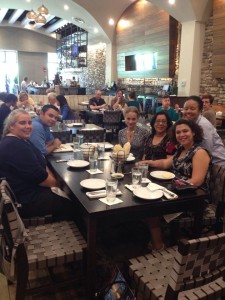This year I didn’t attend the Society of American Archivists (SAA) annual meeting per se, but I attended several meetings and events as part of my official duties as a committee member, as part of what we called the official business side of annual meetings.
I have been a member of SAA for many years (since 1999) and the past 4 years I have been a member of the Cultural Heritage Working Group (CHWG), who charge is:
[to] take the lead in fostering discussion, clarifying issues, and investigating a range of alternative approaches to managing, preserving, and providing access to cultural heritage, given the rights and responsibilities of cultural groups and stakeholders and archivists’ interest in providing equal and open access to all.
In the last 4 years I had the opportunity to be the co-chair of the group (2011-2012) and the online communication point person (2013-2014). This year was my last year as a member so I attended the working group business meeting to finalize tasks given to me last year which included creating an online presence in Facebook and Twitter and to provide a case study based on my experience with the Puerto Rican Civil Court Documents collection that we were able to digitize with the support of CRL-LAMP and the great staff of the digital project team, specifically Michael Bennett. During this year meeting, the new chair, Jennifer O’Neil, focused the discussion on the next steps for the group: gathering case studies that showcase good strategies to better serve cultural heritage collections (e.g. how to balance access to materials with restrictions requested by the creators of these cultural heritage collections); developing best practices and establishing collaboration with other groups such as the education/curriculum committee to further the knowledge of cultural heritage archives issues among the membership.
In addition of attending CHWG meeting, I was invited to speak on a panel sponsored by ARL-SAA Mosaic Scholarship program. This is a new program that got funded thanks to a “$487,652 grant from the Institute of Museum and Library Services (IMLS) Laura Bush 21st Century Librarian Program.” There mission is to:
The ARL/Society of American Archivists (SAA) Mosaic Program promotes much-needed diversification of the archives and special collections professional workforce by providing financial support, practical work experience, mentoring, career placement assistance, and leadership development to emerging professionals from traditionally underrepresented racial and ethnic minority groups. An important objective of the program is to attract and retain individuals who demonstrate excellent potential for scholastic and personal achievement and who manifest a commitment both to the archives and special collections profession and to advancing diversity concerns within it.
I was asked to share my experience as a minority archivist/librarian in SAA and provide my advice on what to do to get their voices heard and foster change in the organization. This was a great experience since the panel was populated with a cross-section of the most inspiring people who shared their life experience in the organization to these graduate studies pursuing careers in archives, special collections or related fields.

A wonderful lunch with LACCHA members and three presenters from Honduras: Nilda Lizeth López Fernandez (far right), Dilcia Mayela Valle (middle right), and Alexander Flores (far left). In addition, in attendance, Theresa Polk (near left), Marisol Ramos, Beatrice Colastin Skokan (standing-right); Natalie Bauer (taking the picture)
Finally, I attended a lunch sponsored by LACCHA (Latin American and Caribbean Cultural Heritage Archives) roundtable to meet and exchange ideas with several archivists from Honduras that presented later that week at the LACCHA roundtable meeting. This was an event that I helped coordinate but this year the roundtable meeting was changed from Wednesday to Friday so I couldn’t attend their meeting (the first time ever since I helped established this group in 2008). I was grateful for having this great opportunity to meet face to face and exchanged ideas with our colleagues from Honduras and learned the similarities between their work and ours.
Although this year I didn’t stay for the annual conference, as you can read there is a lot of work done even before an annual conference started. Most of the work done by committee, working groups and roundtables happen prior to the opening ceremony and I am happy that this year I was able to attend very productive meetings and events!
